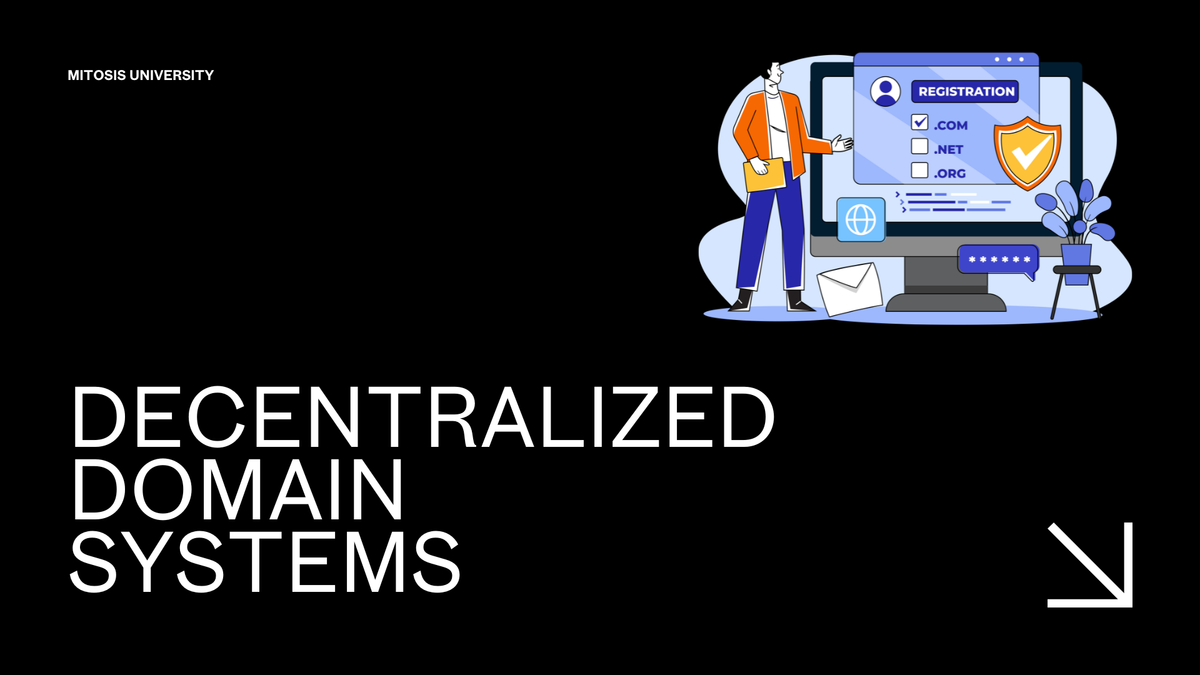Decentralized Domain Systems

Decentralized domain systems, particularly within the Web3 ecosystem, represent a transformative shift in how we manage and interact with domain names on the internet. These systems leverage blockchain technology to create a more open, user-controlled, and censorship-resistant alternative to the traditional Domain Name System (DNS).
Introduction to Decentralized Domain Systems
The internet, as we know it today, relies on a centralized DNS, managed by entities like the Internet Corporation for Assigned Names and Numbers (ICANN). This system translates human-readable domain names (e.g., example.com) into machine-readable IP addresses, enabling users to access websites. However, its centralized nature can lead to issues such as censorship, domain seizures, and reliance on intermediaries, which can compromise user autonomy.
Web3, often termed the "decentralized web," seeks to address these limitations by utilizing blockchain technology. Decentralized domain systems are a pivotal component of Web3, offering an alternative where domain names are registered and managed on blockchain networks. This shift aligns with Web3's principles of decentralization, transparency, and user empowerment, as detailed in resources like Understanding Decentralized Domain Name Systems.
Why Decentralized Domain Systems Matter
Decentralized domain systems are crucial for several reasons:
- Ownership and Control: Users gain full ownership of their domains, stored as non-fungible tokens (NFTs) on the blockchain, rather than renting them from centralized registrars. This ownership is verifiable and immutable, enhancing user trust.
- Censorship Resistance: By operating on decentralized networks, these domains are less susceptible to being taken down by governments or corporations, ensuring content accessibility in restrictive environments.
- Global Accessibility: Anyone with an internet connection and a cryptocurrency wallet can register and use a Web3 domain, democratizing access and reducing geographical barriers.
- Innovation: Web3 domains enable new use cases, such as decentralized websites, crypto wallet addresses, and digital identities, fostering innovation in the digital space.
What Are Web3 Domains?
Web3 domains are human-readable addresses that exist on blockchain networks, serving as alternatives to traditional DNS addresses. Examples include .crypto, .eth, .dao, or .x, which are stored as NFTs on blockchains like Ethereum, Polygon, or Solana. Unlike traditional domains managed by ICANN-accredited registrars, Web3 domains are decentralized, offering users complete control over their digital identities.
How Web3 Domains Work
- Blockchain-Based Registration: Users register Web3 domains through decentralized platforms like Ethereum Name Service (ENS) or Unstoppable Domains. The domain is minted as an NFT and stored in the user's cryptocurrency wallet, ensuring ownership and security.
- Resolution: When someone accesses a Web3 domain, the blockchain resolves it to the associated content, such as a decentralized website or wallet address, using smart contracts for seamless interaction.
- Smart Contract Functionality: Web3 domains can be linked to smart contracts, enabling advanced features like automated payments, decentralized governance, or NFT ownership, as explained in The Concept and Future of Decentralized Web3 Domain Names.
Key Features and Benefits of Web3 Domains
Web3 domains offer several advantages, making them a cornerstone of the decentralized web.
- Decentralization and Ownership
- Decentralized Control: Web3 domains are not controlled by any single entity. Instead, they are managed by the blockchain network, ensuring no central point of failure. This aligns with Web3's ethos of distributing power, as noted in Web3 Domains: Transforming Traditional Investments in 2025.
- True Ownership: Users own their domains outright, unlike traditional domains that require annual leasing. This ownership is verifiable on the blockchain, enhancing security and trust.
- Censorship Resistance
- Immutable Records: Once registered, Web3 domains cannot be arbitrarily taken down or censored by governments or corporations. This is particularly valuable in regions with strict internet controls, as discussed in Fighting Back: Web3 as the Ultimate Catalyst of Censorship Resistance.
- Global Reach: Since domains are stored on the blockchain, they can be accessed from anywhere in the world, provided there is an internet connection, ensuring content remains available despite geopolitical restrictions.
- Accessibility
- Permissionless Registration: Anyone can register a Web3 domain without needing approval from a centralized authority, democratizing domain ownership. This is a significant shift from traditional DNS, as highlighted in How Web3 Domains Enable Decentralized Web.
- Lower Barriers to Entry: Registering a Web3 domain requires only a cryptocurrency wallet and some crypto for fees, making it more accessible than traditional processes that might involve credit cards and identity verification.
- Global Accessibility: Web3 domains can be used by anyone, anywhere, without geographical restrictions, fostering inclusivity in the digital space. Platforms like Unstoppable Domains simplify this process, requiring only basic crypto knowledge.
- Integration with Smart Contracts
- Advanced Functionality: Web3 domains can be linked to smart contracts, enabling features like decentralized marketplaces, voting systems, and automated payments. This is detailed in What is a Web3 Domain?.
- Interoperability: Domains can be used across different blockchain networks and applications, providing a unified identity for users, enhancing their utility in the Web3 ecosystem.
Use Cases of Web3 Domains
Web3 domains have a wide range of applications beyond traditional website hosting, as outlined below:
- Decentralized Websites: Web3 domains can host decentralized websites (DWebs) on platforms like IPFS (InterPlanetary File System). These websites are censorship-resistant and cannot be taken down by centralized servers.
- Crypto Wallet Addresses: Instead of using long, complex wallet addresses (e.g., 0x1234...), users can use their Web3 domain (e.g., john.crypto) as their wallet address, simplifying crypto transactions.
- Decentralized Finance (DeFi) and DAOs: Web3 domains can serve as identifiers for decentralized autonomous organizations (DAOs) and DeFi platforms, enabling governance, voting, and token management.
- NFTs and Digital Assets: Domains can be linked to NFTs, making it easier to manage and transfer digital assets. For example, an artist can use their domain to showcase and sell their NFT collection.
- Metaverse and Virtual Real Estate: In metaverse environments, Web3 domains can represent virtual properties, providing a secure and transferable way to own digital land.
Major Web3 Domain Providers
Several platforms offer Web3 domain registration and management services, each with unique features. Here are some leading providers:
Unstoppable Domains
- Description: One of the largest Web3 domain providers, offering domains like .crypto, .x, .nft, and .eth, with over 4 million registered domains as of recent reports.
- Key Features: Supports decentralized identity, crypto payments, and website hosting on IPFS.
- Website: Unstoppable Domains
Ethereum Name Service (ENS)
- Description: A decentralized naming system built on Ethereum, allowing users to register .eth domains, with over 2 million names registered.
- Key Features: Integrates with Ethereum wallets and supports smart contract functionality.
- Website: Ethereum Name Service
Freename.io
- Description: Offers customizable top-level domains (TLDs) like .cool or .nfts, supporting multiple blockchains including Aurora, Binance Smart Chain, and Polygon.
- Key Features: Allows users to create and manage their own TLDs, earning royalties on subdomain registrations.
- Website: Freename.io
Decentraweb
- Description: Focuses on top-level Web3 domains, allowing users to create and manage their own TLDs, powering hundreds of thousands of domains on Ethereum and Polygon.
- Key Features: Supports tools for decentralized website hosting and domain bridging between networks.
- Website: Decentraweb
Bonfida (Solana)
- Description: A decentralized domain name system for the Solana blockchain, offering .sol domains.
- Key Features: Integrates with Solana wallets and supports decentralized applications on Solana.
- Website: Bonfida
Conclusion
Decentralized domain systems, particularly Web3 domains, represent a significant step toward a more open, user-controlled, and censorship-resistant internet. By leveraging blockchain technology, these systems empower users with true ownership of their digital identities, while offering innovative use cases like decentralized websites, crypto wallets, and digital asset management. However, challenges such as interoperability, user adoption, and regulatory uncertainty must be addressed for widespread adoption.
As the internet continues to evolve, Web3 domains have the potential to redefine how we interact with the digital world, fostering a more decentralized and equitable online ecosystem.
Key Citations
- Understanding Decentralized Domain Name Systems
- Fighting Back: Web3 as the Ultimate Catalyst of Censorship Resistance
- How Web3 Domains Enable Decentralized Web
- Use Cases of Web3 Domains
- Top 12 Web3 Domain Name Registries and Platforms in 2022
- Challenges of Web3 Domains
- The Concept and Future of Decentralized Web3 Domain Names
- What is a Web3 Domain?
- Permanent and Uncensorable Blog with Ethereum ENS and IPFS
- Web3 Hosting: A Beginner’s Guide on How to Host a Decentralized Website
- Exploring the Notion and Prospects of Decentralized Web3 Domain Names
- Web3 domains | Revolution and challenges
- Web3 Adoption Technical Challenges and Solutions
- When Is web3 Going to Become More Accessible?
- Web 3 disruption and the domain name system
- The Future of Censorship as We Transition from Web2 to Web3
MITOSIS official links:
GLOSSARY
Mitosis University
WEBSITE
X (Formerly Twitter)
DISCORD
DOCS



Comments ()